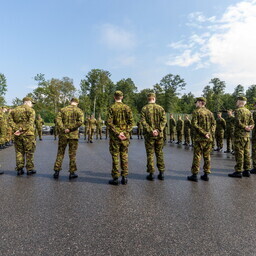Alates 2023. aastast on kasutusele võetud uus korraldus. Selle järgi määratakse
kutsealune väeossa
vastavalt kaitseväe vajadustele. 2025. aastast kehtib see süsteem täielikult.
kutsealune väeossa
Tõlge fraasile: kutsealune väeossa
EN
conscript to a military unit
Varem suunati Ida-Virumaal elavad noored Jõhvi või Tapa linnakusse. Selle tõttu teenis Jõhvis palju ajateenijaid, kellel oli
eesti keelega raskusi
. Uus korraldus aitab seda probleemi vähendata.
eesti keelega raskusi
Tõlge fraasile: eesti keelega raskusi
EN
difficulties with the Estonian language
Kaitseressursside ameti spetsialist Ranno Rokk ütles, et enne ei olnud kutsealuste üksus määratud nende kodulähedusse. "Täna määratakse kutsealune üksusesse vastavalt kaitseväe vajadustele ja nende soovidele," sõnas ta.
Alates 2023. aasta aprillist teatab amet kutsealustele nende teenistuskoha hiljemalt 30 päeva enne teenistuse algust. See võimaldab arvestada kaitseväe vajadusi ja kutsealuste soove.
Rokk rõhutas, et tänase julgeolekuolukorra tõttu on oluline, et
kaitsevägi
saaks kasutada aega ja ressursse tõhusalt. Näiteks kui kutsealune on juba omandanud erialase hariduse, nagu laondus või IT, saab ta oma oskusi rakendada.
kaitsevägi
Tõlge fraasile: kaitsevägi
EN
defense forces
2025. aasta kutsed on esimesed, kus kasutatakse täielikult uut süsteemi. Tagasiside süsteemi kohta on olnud positiivne. Rokk ütles, et süsteem täidab oma eesmärki ja noored on valmis
panustama riigikaitsesse
.
panustama riigikaitsesse
Tõlge fraasile: panustama riigikaitsesse
EN
contribute to national defense
Uus korraldus soodustab ka venekeelsete ajateenijate hajutamist üksustes. See aitab parandada nende
eesti keele oskus
t ilma lisakursusteta.
eesti keele oskus
Tõlge fraasile: eesti keele oskus
EN
Estonian language skills
Kaitsevägi tahab, et ajateenijad, kes alustavad teenistust, oleks parema keeleoskusega. Praegu on mõnel noorel eesti keele teadmised puudulikud, mis takistab
väljaõppe tõhusus
t.
väljaõppe tõhusus
Tõlge fraasile: väljaõppe tõhusus
EN
training effectiveness
Eesti keele õppeks kulub kaitseväel umbes 50 000 eurot aastas. Eelmisel aastal õpetati eesti keelt 400 sõduril. Selle aasta juulis alustas
ajateenistus
t üle 2300 noore.
ajateenistus
Tõlge fraasile: ajateenistus
EN
military service
Since 2023, a new regulation has been implemented. According to it, conscripts are assigned to military units based on the needs of the Defense Forces. Starting in 2025, this system will be fully in effect.
Previously, young people living in Ida-Viru County were directed to Jõhvi or Tapa garrisons. As a result, many conscripts in Jõhvi struggled with the Estonian language. The new regulation helps to reduce this problem.
Ranno Rokk, a specialist at the Defense Resources Authority, stated that previously, conscripts' units were not assigned close to their homes. "Today, conscripts are assigned to units based on the needs of the Defense Forces and their own preferences," he said.
Starting from April 2023, the authority notifies conscripts of their service location no later than 30 days before the start of service. This allows for the consideration of both the Defense Forces' needs and the conscripts' preferences.
Rokk emphasized that due to today's security situation, it is crucial for the Defense Forces to use time and resources efficiently. For example, if a conscript has already acquired specialized education, such as logistics or IT, they can apply their skills.
The 2025 draft will be the first to fully utilize the new system. Feedback on the system has been positive. Rokk said that the system fulfills its purpose, and young people are ready to contribute to national defense.
The new regulation also promotes the dispersion of Russian-speaking conscripts across units. This helps improve their Estonian language skills without additional courses.
The Defense Forces want conscripts starting their service to have better language skills. Currently, some young people have insufficient Estonian language knowledge, which hinders the effectiveness of training.
The Defense Forces spend approximately 50,000 euros annually on Estonian language training. Last year, Estonian was taught to 400 soldiers. This July, over 2,300 young people began their conscript service.

